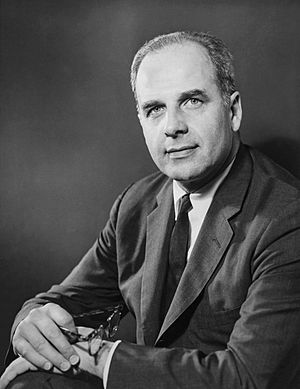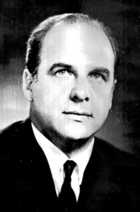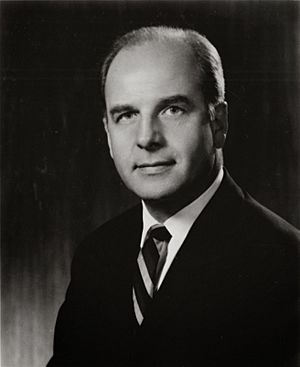Gaylord Nelson facts for kids
Quick facts for kids
Gaylord Nelson
|
|
|---|---|

Nelson in 1963
|
|
| United States Senator from Wisconsin |
|
| In office January 8, 1963 – January 3, 1981 |
|
| Preceded by | Alexander Wiley |
| Succeeded by | Bob Kasten |
| 35th Governor of Wisconsin | |
| In office January 5, 1959 – January 7, 1963 |
|
| Lieutenant | Philleo Nash Warren P. Knowles |
| Preceded by | Vernon Wallace Thomson |
| Succeeded by | John Reynolds |
| Member of the Wisconsin Senate from the 26th district |
|
| In office January 3, 1949 – January 5, 1959 |
|
| Preceded by | Fred Risser |
| Succeeded by | Horace W. Wilkie |
| Personal details | |
| Born |
Gaylord Anton Nelson
June 4, 1916 Clear Lake, Wisconsin, U.S. |
| Died | July 3, 2005 (aged 89) Kensington, Maryland, U.S. |
| Resting place | Clear Lake Cemetery, Clear Lake, Wisconsin |
| Political party | Democratic |
| Spouse |
Carrie Lee Dotson
(m. 1947) |
| Children | 3 |
| Education | San Jose State University (BA) University of Wisconsin–Madison (LLB) |
| Profession | lawyer |
| Awards | Presidential Medal of Freedom (1995) |
| Military service | |
| Allegiance | |
| Branch/service | United States Army |
| Battles/wars | World War II |
Gaylord Anton Nelson (June 4, 1916 – July 3, 2005) was an American politician and environmentalist from Wisconsin who served as a United States senator and governor. He was a member of the Democratic Party and the founder of Earth Day, which launched a new wave of environmental activism.
Early life and education
Nelson was born in 1916 in Clear Lake, Wisconsin, the son of Mary (Bradt), a nurse, and Anton Nelson, a country doctor. He had Norwegian and Irish ancestry. He grew up and was educated in the local public schools. In 1939, he received a bachelor's in political science at what is now San Jose State University in San Jose, California. In 1942, he received an LL.B. degree from the University of Wisconsin Law School in Madison and was admitted to the bar. He practiced as a lawyer before serving in the United States Army, during which time he saw action in the Okinawa campaign during World War II.
Politics
In 1948, Nelson was elected to the Wisconsin State Senate. He remained there until 1958, when he was elected governor of Wisconsin. He served for four years as governor, in two two-year terms, before being elected to the United States Senate in 1962. He served three consecutive terms as a senator from 1963 to 1981. In 1963 he convinced President John F. Kennedy to take a national speaking tour to discuss conservation issues. Senator Nelson founded Earth Day, which began as a teach-in about environmental issues on April 22, 1970.
During his 1968 re-election campaign, Nelson was praised by Vince Lombardi, the General Manager and former coach of the Green Bay Packers, as the "nation's #1 conservationist" at a banquet in Oshkosh. Nelson's campaign turned Lombardi's banquet speech into a radio and television campaign commercial, infuriating Lombardi, the Wisconsin Republican Party, and Vince's wife, Marie, who was a staunch Republican.
Although known primarily for his environmental work, Nelson also was a leading consumer advocate, strong supporter of civil rights and civil liberties, and one of the early outspoken opponents of the Vietnam War. In 1969, Nelson was one of four senators to introduce a bill to establish the Wisconsin Islands Wilderness. ..... As a result of the hearings, side-effect disclosure in patient inserts was required for the pill – the first such disclosure for a pharmaceutical drug.
Nelson was also a noted advocate of small business. While chairman of the Senate Small Business Committee, he led successful efforts to authorize the first modern White House Conference on Small Business, create the system of Small Business Development Centers at U.S. universities, and improve the way that federal agencies regulate small businesses and other small entities, the Regulatory Flexibility Act.
In 1973, Nelson was one of the three senators who opposed the nomination of Gerald Ford to be Vice President. (The other two were Thomas Eagleton and William Hathaway.)
Environmentalism
After Nelson's 1980 defeat for re-election, he became counselor for The Wilderness Society in January 1981. He received the Presidential Medal of Freedom in September 1995 in recognition of his environmental work.
Nelson was inducted into the Wisconsin Conservation Hall of Fame in 1986. The Wisconsin Conservation Hall of fame is located at the Schmeeckle Reserve Visitor Center in Stevens Point, Wisconsin. The visitor center is maintained by the University of Wisconsin-Stevens Point.
Nelson viewed the stabilization of the nation's population as an important aspect of environmentalism.
In 2002, Nelson appeared on To Tell the Truth as a contestant, with his founding of Earth Day highlighted.
Death and legacy
Nelson died of cardiovascular failure at age 89 on July 3, 2005.
The Gaylord Nelson Institute for Environmental Studies (or Nelson Institute) at the University of Wisconsin–Madison is named after him in recognition of his love for nature. In addition, the Gaylord Nelson Wilderness in the Apostle Islands National Lakeshore –comprising more than 80% of the land area of the park – was named after him in honor of his efforts to have the park created. Governor Nelson State Park near Waunakee, Wisconsin, is also named after him. The elementary school in Clear Lake, Wisconsin is named Gaylord A. Nelson Educational Center.
See also
 In Spanish: Gaylord Nelson para niños
In Spanish: Gaylord Nelson para niños



